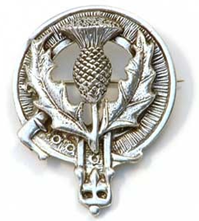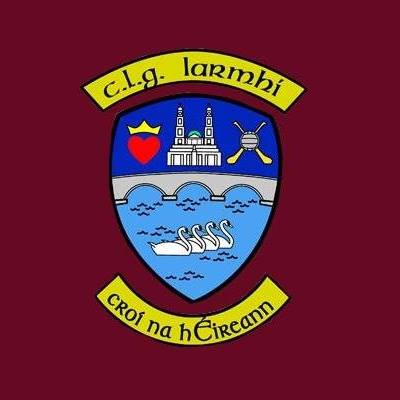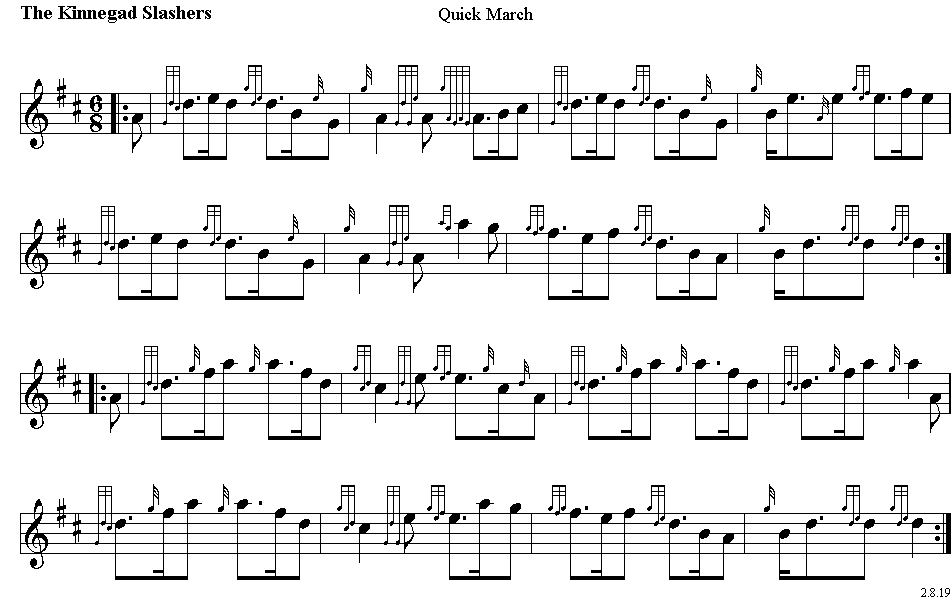 |
||

Best viewed in
|
The Kinnegad Slashers (Buailteoiride Ceann-Na-N-Gad) is also known as "Drunken Mason," "Land of Sweet Erin," "Leitrim Slashers (The)," "Molly Maloney," "O! An Irishman's Heart," "O! Merry am I," "Old Brags (The)," "Paddy Digging for 'Goold'," "Powers of Whiskey," "Slashers," and "Twin Sisters." Kinnegad – meaning ‘the head of the ford of withes’ – is a town in County Westmeath, Ireland. The tune was first published in the third volume of O'Farrell's Pocket Companion (London, c. 1808). The first appearance in print in America was in John Paff's Gentleman's Amusement No. 2 (New York, c. 1812), as "Kinneygad Slashers." O'Neill, in Waifs and Strays of Gaelic Melody (1922), proposed this tune as the antecedent of "Turkey in the Straw." Gearóid Ó hAllmhuráin proposes that this tune was originally dedicated to the Kinnegad, Westmeath, hurling team (hurling being played with ash sticks in a decidedly rough-and-tumble encounter!). However, the title may actually honor an Irish yeomanry unit called the Kinnegad Cavalry, who, on July 11th, 1798, found themselves in defense of Clonard against the rebels. The attack of the United Irishmen was repulsed and the attackers dispersed, whereupon the cavalry of the Kinnegad Yeomen pursued them with much slaughter. Their success in this engagement earned them the sobriquet of Kinnegad Slashers. The Journal for Army Historical Research, Vol. IV, gives that "a lively melody, still popular in Ireland, was named The Kinnegad Slashers in complimentary commemoration of the achievements of that corps at Clonard." The tune has been the regimental slow march of the Gloucestershire Regiment, the 'Glosters', who inherited the nickname of the Old Brags from the 28th Regiment of Foot. Gloucestershire fiddler Stephen Baldwin (1873-1955), a veteran of the regiment, had this tune in his repertoire under the title "Old Brags (The)." Some see resemblances to the Scottish tune usually known as "Kenmure's On an' Awa Willie," (Kenmure's Up and Awa') after a Jacobite song of that name, but the relationship seems more distant than with other more closely related tunes. Others claim to see resemblance in the Scottish "Bannocks o' Barley Meal." A rondo on "The Kinnegad Slashers" was composed by Peter K. Moran and published in Dublin by W. Power, about the year 1817. The air was recorded in several music manuscript copybooks of 19th century musicians. It can be found under the title "Drunken Mason" in 'The Buttery Manuscript (c. 1784-1820, No. 951), a large copybook by John Buttery (1784-1854), who joined the 34th Regiment in Lincoln, Lincolnshire, England, in 1797 and served as a fifer until discharged in 1814. A version was entered into American musician M.E. Eames's music manuscript book (Philadelphia?, 1859, p. 73) as "Irish Air." The melody can also be found in the music manuscript collection of musician John Burk, dated 1821, in the key of 'C' under the title "Irishman in London (The)," with the note that it is a 'Song'. Eames's song air takes its name from a farce by English dramatist William Macready (1755-1829), called The Irishman in London; or, the Happy African (1793), although there was no music in the play. Yorkshire fiddler Lawrence Leadley's "Molly Maloney" is almost note for not the same tune as 'Kinnegad'. Multi-instrumentalist John Rook, of Waverton, Cumbria, entered the tune into his 1840 music manuscript collection as "Kinny Gad." Uilleann piper and Church of Ireland cleric James Goodman also inked a transcription of the tune into his mid-19th century music manuscript.
|
|

